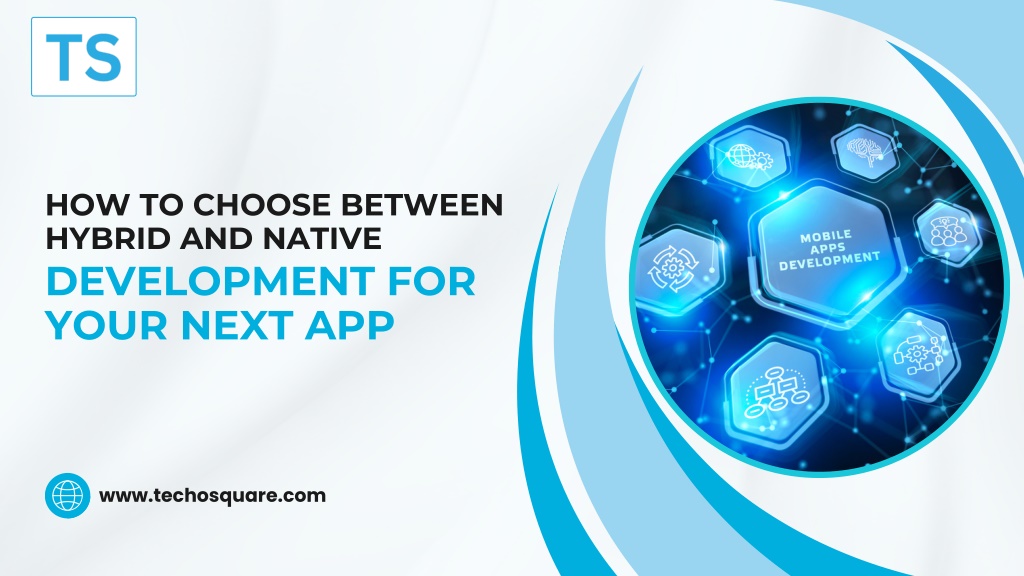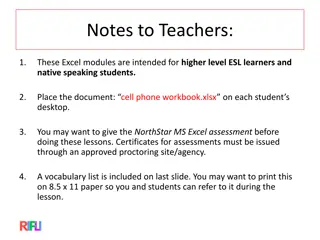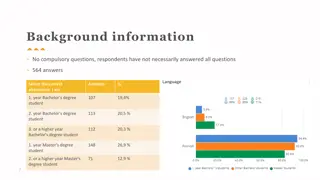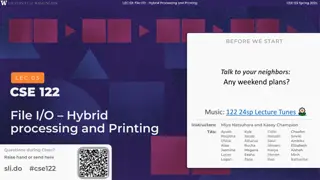
How to Choose Between Hybrid and Native Development for Your Next App
In the fast-moving mobile app world, businesses are typically left with a critical decision: hybrid development versus native for their new app. In most other respects, this drives performance, user experience, development time, and cost. Here at Tec
Uploaded on | 0 Views
Download Presentation

Please find below an Image/Link to download the presentation.
The content on the website is provided AS IS for your information and personal use only. It may not be sold, licensed, or shared on other websites without obtaining consent from the author. Download presentation by click this link. If you encounter any issues during the download, it is possible that the publisher has removed the file from their server.
E N D
Presentation Transcript
HOW TO CHOOSE BETWEEN HYBRID AND NATIVE DEVELOPMENT FOR YOUR NEXT APP www.techosquare.com
INTRODUCTION In the fast-moving mobile app world, businesses are typically left with a critical decision: hybrid development versus native for their new app. In most other respects, this drives performance, user experience, development time, and cost. Here at Techosquare, we understand how critical choosing the right app development platform is for your mobile app. In this blog, we're going to be looking at the following: Hybrid vs Native development; the pros and cons of each; and considerations guiding the choice you will make in your project.
UNDERSTAND HYBRID AND NATIVE DEVELOPMENT Hybrid development is application development with the use of web technologies such as HTML, CSS, and JavaScript, then run inside a native container to use different native features with frameworks like Apache Cordova and React Native to be installed on various platforms. Hybrid applications are web pages placed in a native mobile application shell. On the other hand, Single Native Development builds the app for only one platform, either iOS or Android, using languages and tools specific to the native platform. So, for example, that would be Swift or Objective-C for iOS and then either Kotlin or Java for Android. Native applications aim to harness the features and capabilities unique to each mobile platform for an optimum, flawless user experience.
PROS AND CONS OF HYBRID DEVELOPMENT Cross-platform compatibility Cost-Effective Hybrid development allows you to write code once and deploy it across all the platforms. Savings on development time and effort are so huge that it becomes attractive, and for businesses to reach a wider audience fast, it turns out to be cost-effective. Development costs for hybrid apps are significantly low in comparison to native applications since there is only one app for all the platforms. It helps a lot for startups businesses that have low budgets. and small
FASTER DEVELOPMENT CYCLE With a single codebase, changes, and patches or bug fixes are rolled out on all platforms simultaneously. This makes the development cycle quite agile, as any required improvements can also be incorporated or corrected swiftly.
DISADVANTAGES Performance Issues: The performance of hybrid apps is notably inferior, especially in their speed and response. The usage of web views in developing hybrid applications makes them slower, contains various speeds, and lengthens their loading time. Although both Cordova and React Native offer plugins that help a hybrid app access native device features, hybrid apps often lag in using the full capabilities of the device, as a user could experience a less-optimized user experience.
USER EXPERIENCE The look and feel of hybrid apps might not be exactly like native apps. Users ideally can't resist restricting their options between hybrid and native apps given the responsiveness and quality of the UI/UX.
PROS AND CONS OF NATIVE DEVELOPMENT Better Performance; Since native apps are developed to work on particular operating systems, developers can write them in a manner that the hardware and software of that particular device get exploited. Therefore, the performance also increases, and native apps load faster. Improved User Experience: Since native apps follow the platform's design guidelines and standards (iOS or Android), the user experience regarding their use is great. This tends to place native apps on another level with improved user satisfaction and user engagement with the application at large.
DISADVANTAGES Expensive to Develop: If you are considering developing apps simultaneously for iOS and Android, it will take more time, more effort, and more resources; thus it is quite expensive when it comes to development and maintenance in comparison to developing hybrid mobile applications. More Time-consuming to Develop: Due to separate codebases required by native apps and thus by development, it becomes a process that delays, if not complex. It can delay the time-to-market more so for businesses that want a quick launch. Maintenance Effort: From the above little understanding, maintaining and updating native apps calls for managing two separate code bases. This insists on more time and resources.
HOW TO CHOOSE THE RIGHT APPROACH FOR YOUR APP Take consideration which route you are going to take in development whether hybrid or native app application keeping in mind the following factors to judge the best approach in building an app: Project Requirements and Complexity: Evaluate your app's required features. For high-performance and device-dependent native development. For simple apps with basic functionality, hybrid development can save time and money. complexity and apps, choose
BUDGET AND RESOURCES Think about your budget and the resources available for the development and maintenance process. Hybrid development, in general, is more cost- effective and preferable for start-ups and small businesses. But if you have the budget and the resources for the two native separate applications for iOS and Android, in the long run, the benefits of better performance and user experience may outweigh the cost of the app.
User Experience Evaluate how important the user experience is for your application. Generally, native applications are more polished and responsive, meaning a lot goes into user satisfaction and retention; therefore, if you want your user to have the best experience ever, then native development should be the way to go. How Scalable It Is : Think about long-term scalability and maintenance for your app. Native apps can be scaled in a much better manner with more ease and optimized for future development and new features. Hybrid apps are at their ease in maintenance at the start, but this can hold you back in the long term as the app scales.
THANK YOU Contact Us www.techosquare.com +91 (172) 4639432
















































